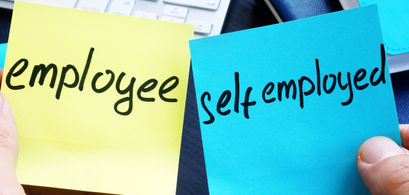Approximately 16.2 million people are self-employed in the US, a small pool in comparison to the 160.72 million-strong employed workforce.
An analysis from the experts at Moneyzine.com can reveal that self-employed workers earn considerably less across every state than employed workers - but, on the flip side, employed workers are more stressed, have a worse work/life balance, and lower job satisfaction. So, what’s the better side of the coin to sit on?
Money is one factor - but what about the bigger picture? Who has a greater sense of satisfaction in their job role? A better work/life balance? Lower stress levels? To find out, we asked 2,000 US adults (split equally between employed and self-employed individuals) not only about their satisfaction levels in their employment status, but also about their biggest concerns, work/life balance, enjoyment, and more to find out once and for all: who’s happier? The results speak for themselves…
Key takeaways:
Self-employed individuals report a greater work/life balance, greater satisfaction within their role, and less stress than employed workers - despite earning significantly less
17% of self-employed workers would not change their employment status for anything.
On the flipside, 95% of employed workers would change to self-employed for a number of reasons (income, increased job security, hours worked, or better work/life balance)
Despite working set contracted hours, employed workers have a worse work/life balance than self-employed individuals, with more self-employed workers very satisfied with their work/life balance.
Methodology
The experts at Moneyzine.com conducted a survey on 2,000 US adults in the UK - half employed, and half self-employed to assess their levels of job satisfaction, stress, work/life balance, main concerns, and more. This survey has given us a unique insight into directly comparing the overall happiness both groups experience in their roles, allowing us to assess how self-employed and employed individuals measure up across these categories.
Next, we used the last five years of mean earnings data from the US Census to provide a deeper insight into the annual earnings of each group across states - helping us to draw an analysis between the happiness of each group compared to their differences in earnings.
Employed vs Self-Employed Earnings Across the US
We looked at the most recent five years of data from the US Census on the mean earnings of salaried workers vs self-employed workers across every state in the US, and found that, on average, self-employed workers currently earn a huge 56% less than salaried workers.
On a state level, even more shocking variances can be seen. In the District of Columbia, where wages tend to be amongst the highest in the country, self-employed workers earn a mean salary of 70% less than salaried workers. The smallest gap is in West Virginia, but even then, self-employed workers earn 41.5% less.
5 Year Differences
The most recent data is from 2021, so it’s important to note that any effects COVID-19 may have had on the earnings of salaried or self-employed workers may only just be starting to be recorded. However, even looking between 2016 and 2021, there are a number of notable findings.
For one thing, despite having a huge gap in mean income, both self-employed and salaried workers’ incomes increased at a fairly steady rate. Self-employed workers' incomes have increased by around 13%, whilst salaried workers earnings have increased by around 14% in the last five years.
What’s more, self-employed workers in Utah saw a huge leap in their mean earnings - increasing by 55% in the last five years. In contrast, the mean income of salaried workers in the same state increased by just 20%.
1 In 3 Self-Employed Workers Dissatisfied With Their Income
Our survey, conducted on 2,000 self-employed and salaried workers in the US (split evenly between the two groups), found supporting evidence for these figures. 1 in 3 self-employed workers reported being very dissatisfied with their current income - with 13% saying that they were currently very dissatisfied.
However, it’s also interesting to note that 1 in 10 self-employed people surveyed said that they were actually very satisfied with their income.
Employed respondents, on the other hand, sat squarely in the middle - with most not overly satisfied or dissatisfied with their income as opposed to their counterparts, who seem to have a much stronger opinion on the matter. Just 5% of the respondents from this group were very dissatisfied with their income - a sharp difference.
This begs the question, are self-employed individuals dissatisfied with the figure they are earning, or simply more likely to be dissatisfied because of the greater level of control they have over their earnings compared to someone employed?
Self-Employed Workers Are Happier, Less Stress, And Have A Better Work/Life Balance
One might think that the better paid individuals are more likely to be happier - money buys happiness, after all? The results from our survey, however, show significantly different findings to what the official earnings data might suggest.
4 in 10 self-employed respondents described themselves as either happy or very happy with their current employment status. On the other end of the scale, almost 1 in 3 of employed respondents were unhappy or very unhappy with their employment status (compared to 20% of self-employed individuals).
Self-employed respondents were markedly most satisfied with their work/life balance, too. 17% described themselves as very satisfied with this aspect, while a further 27% agreed that they were satisfied with their work/life balance. Employed respondents, however, are markedly less satisfied with how they are maintaining this balance in their current employment status.
What’s more, self-employed people report lower levels of stress from their job to employed people. Just 4% of employed respondents said their job is not stressful at all, compared to 1 in 10 of self-employed individuals who report zero stress-levels at work.
Being Your Own Boss And Flexibility Remain Top Reasons To Be Self-Employed
It’s easy to see that self-employed people may be the group with a higher overall satisfaction than employed individuals (even despite a vast difference in earnings, so perhaps the real question is: why?
Our survey found that the top three factors self-employed individuals most enjoy about their job is:
Being their own boss (26%)
Flexibility i.e. being able to work from anywhere) (16%)
Working independently (14%)
In contrast, the top three things employed individuals most enjoy are 1) socialising (13%), work/life balance (12%), and income (10%).
The difference between mean annual earnings of self-employed people versus employed individuals may seem shocking at first glance - but the findings of our survey show that most self-employed individuals rely on many other factors for job satisfaction than just their income.
With less stress and a greater work/life balance, it’s perhaps unsurprising that the rise in popularity of self-employment and the gig economy continues in 2023.Jonathan Merry, Personal finance expert at Moneyzine.com
Income Remains Number One Concern For Both Groups
One of the only factors these two groups have in common is that they mutually share a main concern regarding their income when it comes to the state of their employment. Out of 11 options, this was the top concern for both parties - despite income being one of the top three things employed individuals enjoy about their current role.
US workers have just begun to see pay gains faster than inflation in 2023, according to the US Bureau of Labor Statistics - but it’s no surprise that years of pay losses and rising costs have left many concerned over their income.
Almost 3 in 10 (28%) of self-employed workers said that income was their main concern regarding their current role. Fewer employed respondents (18%) said the same, despite this being the most commonly selected answer. Employed respondents were also more likely to select other concerns, such as boredom (13%), and lack of flexibility (14%).
Self-employed respondents, on the other hand, largely either focused on their income, with the second most-commonly selected answer being that they had no concerns in particular (13%).
Income And Fewer Hours Main Motivators For Employment Switch
As the two data sets used here might suggest, the number one reason self-employed respondents said they would consider switching to a salaried/employment position was for higher income (49%). Given that US self-employed individuals have a mean income 56% lower than that of employed individuals, that’s perhaps not surprising.
The second most-popular reason was being able to work fewer hours for the same amount of money (27%). This was the number reason for employed respondents to consider switching in employment status - followed by a higher income (32%).
It’s worth noting that 17% of self-employed respondents said they wouldn’t consider switching to an employed role for any reason. Just 5% of employed respondents said the same - suggesting far more employed
Conclusion
The data is clear; many self-employed individuals will make huge sacrifices on their income in order to gain more independence, flexibility, and control over their job. Since 2020, the number of self-employed people has continued to grow year-on-year, perhaps suggesting that the effects of the pandemic continue to be shown.
In a country in which remote working is more popular than ever, more people may be tempted to move towards the higher quality of life that comes with being self-employed, instead of seeking the pay check.
Contributors





